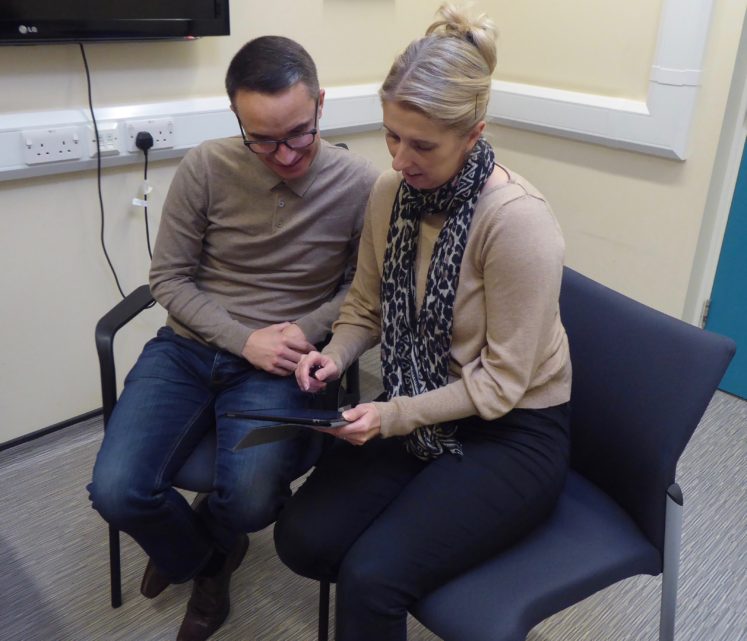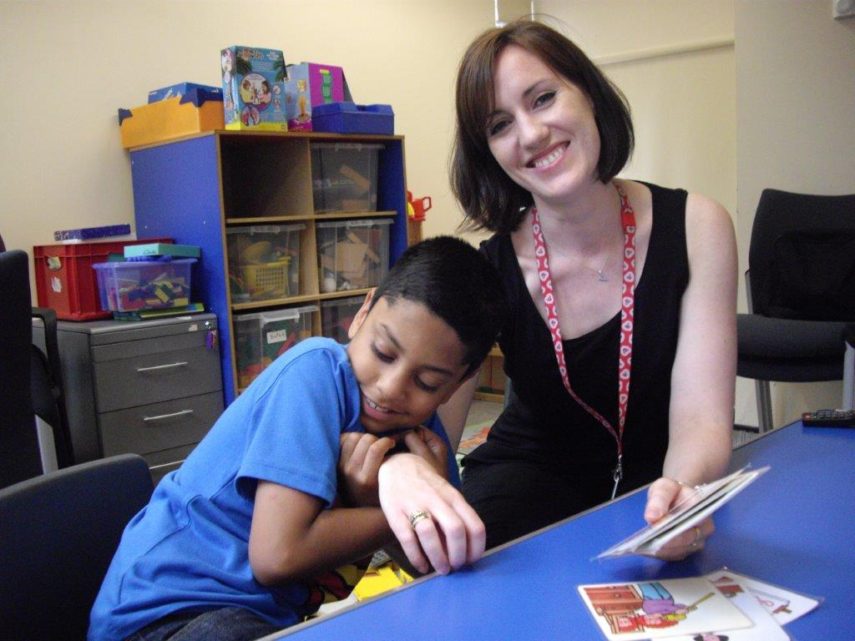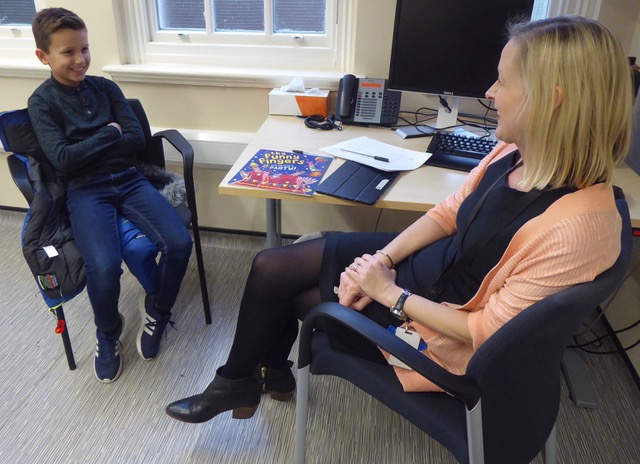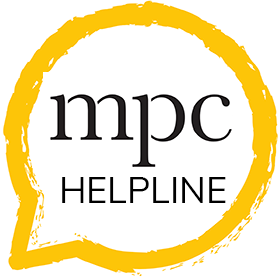Assessments for 2-18s
The MPC assessment clinic
The Michael Palin Centre assessment clinic for 2-18’s is a stand-alone service which is NHS-funded and charitably-funded by the Stuttering Foundation. It enables us to give you advice and make recommendations for you and your child and is for families from anywhere in the UK. International families, or UK families wishing to be seen more quickly than is standard for our assessment clinic can arrange a private assessment.
If you live in Camden, Islington (or if your child is registered with a Camden or Islington GP), or if you live in Newham and your child is over 7 years of age, then the assessment clinic can be the first step in your child receiving therapy at the Michael Palin Centre.
If you live elsewhere in London or the UK then attending our assessment clinic does not automatically mean that you will attend the Centre for any therapy that we recommend. The therapist that you meet will discuss options with you. Feedback from parents is that the assessment is helpful in its own right.
The assessment clinic is an opportunity for
- children and young people to talk about their experience and decide what help they would like
- parents to talk with an expert clinician and get advice which is tailored to them and their child
- SLTs to get support for their continuing work with a family or to help their families access specialist therapy at the MPC
Typical wait time for an NHS funded / charitably-funded assessment: 4 months (families from Camden, Islington, Newham); 6 months (families from elsewhere)
Typical wait time for a private assessment: 2 months
Remote or face-to-face options
You can either have your assessment remotely or in person at the Centre, as you prefer.
Watch our videos for parents or for children and young people about how our remote assessments work.
What parents have said about the assessment clinic

“The therapists are extremely friendly, warm and reassuring. They put us and our child very much at ease.”
“The therapists’ professionalism and expertise made the whole difference. We felt that we were in very experienced and safe hands.”
“I don’t feel alone now. I have been listened to and honestly feel like my child will benefit going forward.”
“It was empowering to be told that my instincts are good!”
“The day was fantastic and the team are brilliant.”
“It really helped me to understand what my daughter is thinking and feeling and how I can support her.”
“It gave me a better understanding of how to talk about stammering with my son and how to help him with his speech and his emotions.”
“This has given us hope and a plan of action to help our son. We feel very positive about the future. It has given us confidence!”
“Our son has loved it!”
What kids have said

“I think other children should come here because it’s a really nice place and they could help you.”
“It was really helpful with my talking.”
“I liked it and I had fun.”
“The therapist explained things in a helpful way.”
“It was extremely helpful just talking about how I felt about my stammer and different stuff like that. “
“It was really useful to properly open up about my stammer and how it effects me.”
“It helped me to realise that I’m not alone and that there is help out there.”
“I know who to talk to if I need more help.”

How your appointment will be arranged - depending on where you live
We live in Camden, Islington (or are registered with a Camden or Islington GP) or Newham (with a child over 7 years).
You will receive two appointments. (Your appointment letter will give all the information that you need about accessing this appointment remotely if relevant).
The first appointment is for your child. This appointment lasts for about two hours. One parent needs to attend (if at the centre), or be available to support your child if a remote session.
The second is for you as parents. Your child does not attend this session. This appointment lasts for around four hours (either a whole morning or a whole afternoon). If you are a two-parent family both of you will need to attend.
Your child’s assessment will be funded by the NHS.
We live elsewhere in the UK
You will receive one appointment.
You will meet two therapists, one of whom will spend time with your child while the other will spend time with you as parents. If your appointment is for a remote assessment you will need to have two separate devices in two separate rooms. The appointment lasts for around four hours (either a whole morning or a whole afternoon). If you are a two-parent family both of you need to attend.
We will liaise with your local speech and language therapist if you have one and invite them to attend as well, either in person or remotely. This will mean that we can decide together how best to help your child.
If you are attending remotely and you feel that your child is too young to manage a remote on their own, then we can arrange your child’s appointment and your own appointment at separate times so that you can be with your child during their session if they need you. Please let us know if you prefer your session to be split in this way.
Your child’s assessment will be funded by the NHS / the Stuttering Foundation.
We are not UK residents
You will receive one appointment.
You will meet with two therapists, one of whom will spend time with your child while one will spend time with you as parents. If you are attending remotely you will need two separate devices in two separate rooms. The appointment lasts for around four hours (either a whole morning or a whole afternoon). If you are a two-parent family both of you will need to attend this appointment.
Your assessment will not be not NHS or charitably-funded. Please contact us about making a private appointment.
We need to receive payment for your child’s assessment before we are able to send you an appointment.
What to expect on the day
Your child’s appointment
The therapist working with your child will:
- spend some time making sure that they are settled in before starting the assessment. You may asked to have some time playing with your child first to help them settle.
- have a conversation with your child to get a sense of how much they are aware of stammering, how much it bothers them, how much it is impacting on their everyday life and confidence and whether they would like help.
- look at the questionnaires that your child has completed.
- make a short video of your child talking.
- complete a screening assessment of your child’s language skills if this has not already been done by a local speech and language therapist.
Your own appointment
The therapist working with you will:
- ask you questions about different aspects of your child’s life. This helps us to get to know your child and make recommendations which will be the best fit for him or her.
- tell you about your child’s session, explain the assessments that were completed and talk with you what these tell us.
- give you information about stammering
- make recommendations about next steps and discuss these with you so that you can make a decision about what you would prefer.
- take time to answer any questions that you have.
- If you live in Camden or Islington, or are registered with a Camden or Islington GP) or live in Newham and your child is over 7, your child will be put on our waiting list as soon as we receive the referral.
- If you live elsewhere in the UK we will start liaising with your local service and check whether they are able to meet your needs first. We will contact you if your local service is well placed to meet your child’s needs.
- If you are put on our MPC waiting list you will receive an acknowledgement and then an appointment letter.
- You will need to contact us to confirm your appointment. If you need to re-schedule your appointment this will probably mean waiting longer.
- You will receive some paper and online questionnaires to complete before your appointment. If you or your child need help completing any of the questionnaires then you can bring them to the session and the therapist will help.
Expect to wait 2-3 months from referral to your assessment date if you live in Camden, Islington or Newham. If you live elsewhere your wait time is more likely to be 6 months.
If you prefer to be seen privately we aim to see families within 2 months of receiving their referral. The fee for a private appointment is £1,000 (UK families) or £1,200 (overseas families). This pays for 8 hours of therapist time.
We are sometimes able to offer short-notice appointments if we have a cancellation, however we do still need both parents to be here for the parent session if you are a two-parent family. Short-notice appointments may not be possible if you have a local speech and language therapist who will also be attending.
Let us know if you would like to be contacted about a short-notice appointment.
Please don’t worry if this is the case. Stammering varies a lot and we won’t necessarily see your child stammering in the same way that you may at home or on other days. You will be able to talk things through with your therapist so that he or she fully understands how your child’s speech can be at other times.
If your child’s assessment happens over two appointments then you may be invited to sit in and watch if that will help your child feel comfortable and concentrate well. When children are older, or if it is harder for your child to concentrate with a parent in the room then your therapist may suggest that you wait outside. Older children may use the session best when they are on their own with the therapist. Parents do not routinely sit in the session once their child is at secondary school.
Let us know on your referral form that you would like an interpreter. We make every effort to provide professional interpreters through Whittington Health NHS services. Sometimes it is not possible to find an interpreter and in this case we will contact you beforehand.
No. Please contact us as soon as you know that this is the case as we will not go ahead with only one of you here. Contacting us early means that we can get in touch with your local speech and language therapist, if you have one, in good time, and also give someone else the slot. We will make a new appointment for a date when you can both attend.
We will value meeting with both of you but we prefer to offer separate appointments to parents who live separately.
Please let us know on your referral form that you live separately or call us to let us know that this is the case before you make plans.
It takes about 2 and a half hours to complete a case history with parents and the same amount of time for the child or young person to complete their assessment.
If your child and you are both attending at the same time there is a break which lasts for about 30-40 minutes when your two MPC therapists and your local therapist will confer.
Finally your therapist will give you some information about stammering, go through your child’s assessment results and discuss the main things which seem to contribute to their vulnerability to stammering. Time is also spent discussing recommendations, answering any questions that you have and agreeing a plan.
Altogether this takes about 4 hours. Please make sure you plan your journey accordingly.
Our staff will work with you, your son or daughter, and your local therapist if you have one to help you decide what you would like to do next.
We offer suggestions and recommendations based on our time with you and our expertise in stammering and we then invite you to consider what you would like to do.
With our teenage clients we encourage them to be active in this decision-making process and we explain this at the beginning of the session.
Sometimes people make decisions while they are here, and sometimes people take more time to think things over. Occasionally we need to find out more about what local services can provide before we finalise the plan.
Not necessarily. If you have a local speech and language therapist who can carry out what we recommend then you will not need to come to us.
If you live in Camden or Islington (or are registered with a Camden or Islington GP), or if you live in Newham and your child is under 7 years of age then you will come to the Centre for any therapy that we recommend as we have an agreement with those boroughs to provide a service for families who stammer.
Sometimes families from other boroughs also come to us for therapy. This is when a joint decision has been made that we should apply for funding to enable this to happen. If you live in a borough where we have a pathway to local NHS Commissioners then we will be able to apply for funding for your child to attend the Centre. The length of time that this takes varies and it is not always successful.
It is also possible to pay for therapy privately.
Young people
What to expect
You will have time with one of the MPC therapists. If you have a local SLT who comes to the session with you, and if you are 15 or over, then, if you agree, your therapist may also join your session. If you prefer that they do not join your session you can let us know.
Your MPC therapist will spend time finding out from you about your stammer, how it is affecting things for you, and whether you are wanting therapy at this point. You will have already completed some questionnaires before coming to your appointment and the therapist may have a couple more for you to fill in as well.
If you are willing, the therapist will ask you to do some reading aloud and talking about a topic of interest to you while you are being video-recorded. Your stammering probably varies so this is just a snapshot but it can help us to see a bit of what it can be like for you.
The most important part of your session is the conversation that you have with the therapist. Your therapist will ask you a lot of questions but it isn’t any kind of test. There are no right or wrong answers, it is just a way for us to get to know you. This matters because everyone’s experience of stammering is different.
Your therapist will talk a bit about stammering with you if you are interested to know more about it. He or she will check that they have understood your point of view and will tell you about therapy options that seem to be a good fit and that you can think about.
No-one will tell you what to do. Your views matter and this session is a chance for you to decide for yourself what you want.
We want you to feel in charge of the decisions that are made so if you prefer to not have therapy at the moment then that’s ok.
That’s ok. We know that stammering varies a lot. We may not see your stammer the way it can be on some days, but you’ll be able to tell us about it.
If you are over 16, then you do not have to have a parent come with you, however we still recommend that you have one parent come along. When parents come too they have their own, separate session with another MPC therapist.
SLTs
You will be invited to attend the assessment clinic if:
- you made the referral.
- a colleague that you have taken over from has previously made the referral.
- parents have made the referral and told us that you are working with their child.
What to expect
You will have time with the MPC therapists before the session starts. This is so we can find out what you are hoping for from the session. This may be fairly general if you have only recently met your client, or you may have specific ways that you hope that the assessment will help.
Once the assessment session starts you will be watching the MPC therapist. We will ask you to not take notes during this part of the assessment.
If you are attending with a young person aged 15 or over then, with their consent, we will invite you to sit in on their session.
If you are attending with a pre-school or school-age child then we will invite you to sit in on the session with parents.
There is a break in the assessment during which you and both of the MPC therapists will have time to share information about the assessment, reflect on what you know and agree recommendations. Your view during this discussion is valued. You can take notes during this time.
The assessment clinic finishes with a discussion time with parents, and if appropriate with the child or young person. This is when the MPC therapist working with the parents will talk them through about the assessment results and the key ideas that have come up. We aim to finish the assessment clinic with a clear plan of action that everyone feels is a good fit for them.
Expect to wait 6 months from your making the referral to your client’s assessment date. Please contact us if you feel that your client needs an urgent appointment.
We normally send out appointment letters three months ahead of the assessment date. If you confirm an appointment and then later request an alternative, this may result in a delay for the family of up to 2 months.
Yes. Please let us know beforehand that you would like to do this and confirm that you have the parents’ or young person’s consent.
Very important. Please help us by completing the language assessments required before the assessment date. This gives us more time in the session to focus on stammering and possible therapy directions.
Please let us know who we should contact to attend with the family instead. This should ideally be a therapist who will go on to work with the family if therapy takes place locally.
The clinical team (MPC therapists plus local SLT) discuss the assessment and recommendations together before these are discussed with the parents or young person. Our aim is to work with you so that our recommendations reflect what everyone feels is clinically appropriate.

Sometimes you just need someone to talk to


Sometimes you just need someone to talk to
Our Helpline, 020 3316 8100, is open during office hours (9am-5pm) and voicemail messages can be left when the office is closed.
“The therapist explained things in a helpful way.”
Become a Friend
Receive emails with news and information about the Centre's work, events, and fundraising.
Sign up